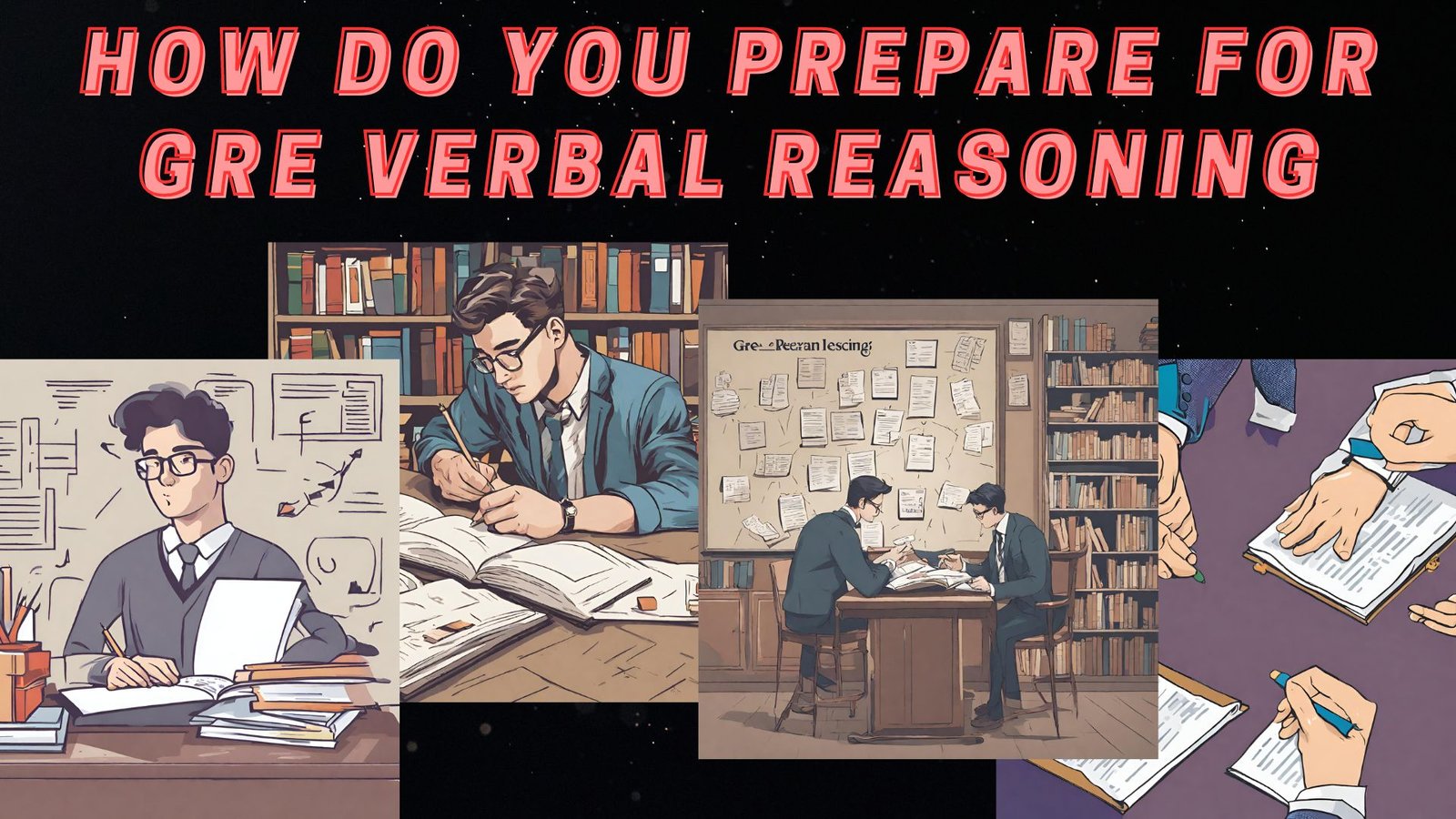GRE verbal reasoning is an important step of the test. Therefore, after completing the GRE registration, you must start the preparation. GRE stands as a crucial milestone for many graduate students. It assesses more than your knowledge. GRE has many chapters that evaluate critical thinking. However, verbal reasoning is key to passing the test.
In particular, the GRE verbal reasoning is a challenge for many test-takers. It requires a particular approach. You must know the words to understand what the test is asking. Let’s explore how to prepare for GRE verbal reasoning.
Exploring GRE Verbal Reasoning
Understanding the nature of the hurdle is necessary. Otherwise, you cannot conquer it. Initially, The GRE verbal reasoning assesses your ability to analyze. Next, it tests your mind to evaluate the written material.
However, it doesn’t just mean understanding the literal content. It tests your reasoning abilities under the lines. You must identify the relationships between different parts of sentences. Also, you need to recognize subtext and implications.
The section comprises two Verbal Reasoning sections. Furthermore, there are 25 questions per section for a total of 50 questions. They test the following:
- Firstly, you analyze the text.
- Secondly, you reason from incomplete data.
- In addition, you identify the author’s assumptions and/or perspective
- Fourthly, you understand multiple levels of meaning. You must identify the literal and figurative text. Also, you must discuss the author’s intent.
- Finally, you know the meanings of words and sentences. You must read entire texts initially.
- Lastly, you understand the relationships of words with concepts.
Official Books for GRE Verbal Reasoning Section
You can study those books for the verbal section-
- Official Guide from ETS website
- Secondly, the official Verbal Practice Book
- Two paper-based GRE PDFs.
- Lastly, GRE official online tests.
Crafting a Study Plan for GRE Verbal Reasoning
The GRE is not a cramming test. It requires sustained effort over a while of time. Moreover, you must develop a successful study plan for the verbal reasoning section. In addition, you must assess your current skills. There are always areas for improvement. Consider the steps:
GRE Verbal Reasoning Diagnostic Test
Firstly, take a full-length diagnostic test. It will help you understand your starting point. Next, you highlight high-leverage areas for improvement.
Set Realistic Goals:
Subsequently, you must Set a clear target score. It applies to the verbal reasoning section. Therefore, it will keep you motivated. At the same time, it will also dictate the intensity of study sessions.
Focus on Weaknesses:
The diagnostic test will highlight areas that need work. In addition, the study plan allows ample time to improve mistakes.
Consistent Practice:
Schedule regular study sessions. It’s more effective to study for an hour each day. In other words, avoid a marathon session once a week.
Monitor Your Progress:
Lastly, regularly take practice tests. You can track your improvement. Finally, adjust your study plan also.
Vocabulary Mastery
Vocabulary is the foundation of the GRE verbal reasoning section. Unfortunately, it is the scariest part of GRE preparation. However, the secret is simple. You try to read some journal articles for a score of more than 150.
Also, try to communicate with your families and your friends with new GRE words. As a result, you remember the vocabulary easily rather than memorizing. You can also follow Kaplan, GRE’s official website, to learn basic words.
The website summarizes the GREs. You can try Barrons high-frequency words. In addition, the Magoosh flashcards do well. They are helpful for learning GRE vocabulary.
Active Learning
Do not absorb word lists. Rather, engage with the material. Here are a few effective techniques for GRE verbal reasoning
Root Definitions
Foremost, recognize word roots to understand the meaning of unfamiliar words.
Using Words in Context
Do not memorize isolated words. Instead, place them in sentences. It will help you understand when and how to use them.
Flashcards
Thirdly, create flashcards for quick and on-the-go review.
Tools to Expand Vocabulary for GRE Verbal Reasoning
Here are some resources that will help you build your vocabulary:
GRE Word Lists
Foremost, begin with the most common GRE words. At the same time, you need to make sure you are covering a good range.
Online Apps and Tools
Also, websites and apps focusing on the GRE. They bring an interactive element to your learning.
Reading High-level Material
The New York Times, The Economist, and other literary classics improve grammar.
GRE Verbal Reasoning Understanding
The Reading Comprehension portion is vast and variable. Furthermore, it ranges from short passages to long articles on complex topics. To deal with this:
Skim Read
Foremost, practice reading the beginning and end of a passage. However, do not focus too much on the details. It will help you set the context and understand the main argument before going through it in detail. Also, you can try to practice Kaplan’s book. It will improve your understanding of the reading section.
Active Reading
Underline Key Points:
Firstly, it will help you remember the details. So, you answer questions confidently.
Summarize Paragraphs
Secondly, mentally summarize the main ideas of each paragraph.
Ask Questions
In short, read with curiosity. It will generate questions that the author should answer. The way of reading builds interest.
Sentence Equivalence and Text Completion
Many students use Kaplan test preparation. Also, Manhattan Test Preparation is an excellent study guide.
The sections offer a strong understanding of the English language. You focus on sentences. And the relationship between words improves.
Identify Keywords
Also, you must identify the most significant words or phrases. As a result, you understand the flow of GRE Verbal reasoning.
Predict Answers
Initially, try to predict what type of word would fit the blank. You can guess the meaning of the synonym. Next, look at the options. It will help you eliminate incorrect answer choices.
Practice Contextual Usage
Lastly, work on sentence and word relationships. You can make your sentences using relationship structures.
Critical Reasoning and Analysis
The GRE verbal reasoning section isn’t a vocabulary test. On the other hand, many think it assesses your reading. It is a reasoning test. You need to understand the implied meaning. Moreover, you highlight the logical structure of arguments.
Identify the Argument Structure
Learn to map out the underlying structure of arguments. You can identify the conclusions first.
Recognize Varieties of Evidence
Also, learn to differentiate between strong and weak evidence. It will help you separate fact from opinion.
Consider Multiple Perspectives
When evaluating an argument, consider not just the stated viewpoint. You must think about the potential counterarguments.
Taking GRE verbal reasoning Practice Tests
Practice tests are invaluable for GRE preparation. They introduce you to the test format, help you manage your time and stress, and are a barometer of your progress.
Simulate Test Conditions
- Take practice tests in a quiet environment. Also, you must strictly follow the time limits.
- You can give 2 practice tests from the ETS website.
- When you go to the ETS website, you will see the GRE login homepage.
- Next, you log in and see the GRE preparation section.
- Then, you need to click on free test preparation.
- You will get 2 free tests, just like the real test.
- Always try to give those 2 exams in an exam environment with the same mindset.
- Also, do not give those 2 tests if you are not prepared.
- When you think you are ready, then go forward and take those exams.


ETS also offers 2 paid that are very similar to the GRE test exams.
Price for each one is $39.95. It is a little expensive. But you can test yourself before the exam.

Review Mistakes
Your real improvement comes from reviewing. Also, you can assess why you got a question wrong. First, identify the exact mistake. Was it vocabulary, sentence structure, or logic? Then, analyze the explanation carefully. Finally, apply the learning to similar questions. You can repeat the process. It will increase accuracy over time.
Increase Difficulty Gradually
Begin with easier practice tests. Next, make your way up to more challenging ones. You can slowly build the skills. Initially, start with basic vocabulary and simple reading passages.
Then, move to tougher questions with complex wording. The approach will help you develop confidence. You master GRE verbal reasoning effectively.
GRE verbal reasoning Exam Day Strategies
Preparing for exam day and understanding strategies to tackle the test itself are just as important as the content studied.
Time Management for GRE verbal reasoning
Good time management improves your GRE verbal score. Therefore, allocate time wisely for each question. Then, avoid spending too long on difficult questions. Next, move on and return later if needed. Finally, practice with timed tests to improve speed. Consistent practice helps manage time quickly.
Staying focused helps you use time well. You can read questions carefully before answering. Prioritize easier questions to secure points quickly. If unsure, make an educated guess. Next, move on. You can check the answers. However, do not overthink. Practice under timed conditions to build confidence. Good time management reduces stress. It increases performance.
Mental State for GRE verbal reasoning
- A calm mind helps you perform better.
- First, sleep well.
- Then, eat a balanced meal. It will keep you energized.
- Next, practice deep breathing.
- Finally, believe in your preparation.
Confidence and relaxation improve focus. As a result, it is easier answer questions accurately. Managing stress is essential for GRE.
- Take short breaks between practice.
- Also, review key concepts.
- Trust your knowledge.
Stay positive. A strong mental state improves concentration. It will help you perform better.
Learn New Words for GRE Verbal Reasoning
You can use flashcards to review words. Also, read high-level articles and note unfamiliar words.
- Memorizing words is not enough. You must understand their meanings and usage.
- Thirdly, learn synonyms and antonyms to recognize word relationships.
- Furthermore, break words into roots, prefixes, and suffixes for easier recall.
- Finally, practice using new words in sentences. Regular exposure to difficult words improves comprehension. It boosts confidence during the GRE verbal test.
- Lastly, practice vocabulary-based questions to reinforce learning.
- Also, expand your vocabulary steadily over time. It will make answering GRE verbal questions faster and more accurate.
Reading Comprehension Techniques
Reading comprehension requires active reading. First, skim the passage for the main ideas. You can highlight key points and transitions. Also, focus on understanding the author’s argument.
Carefully eliminate wrong answers. Practice with different passages to improve speed. You can master the skills to help you answer GRE verbal questions more efficiently.
Understanding question types improves accuracy. Some ask for the main idea. On the other hand, some test analytical skills. Read each question before the passage to identify what to focus on.
Lastly, avoid personal opinions. Always rely only on passage information. Consistent practice sharpens reading skills. It improves confidence in tackling comprehension questions.
Don’t Panic
If you encounter a question that stumps you, guess and move on. You’re not penalized for incorrect answers. Therefore, it is better to make an educated guess. Instead, do not leave a question unanswered.
Confidence helps you stay focused. Breathe deeply and remind yourself that one question won’t define your score. If unsure, use context clues and logical reasoning. Trust your preparation and avoid second-guessing too much. A composed mind helps you navigate the test efficiently. Thus, it improves your overall performance.
Final Thoughts on GRE Verbal Reasoning
Preparing for the GRE verbal reasoning is simple. It requires dedication and patience. A strategic approach goes a long way. It demands academic knowledge. Also, you must develop critical thinking skills. Remember, your goal is not simply to pass the test. You gain the skills and insights that GRE preparation offers.
GRE verbal reasoning requires a solid study plan. You must improve your vocabulary. Improve your reading comprehension and critical reasoning. As a result, you are in a strong position to answer GRE questions.
Lastly, good luck on your GRE journey! May your verbal reasoning skills carry you confidently to your desired score. Read the guide to registering for the GRE now. You can email at support@bornomalathebd.com for queries.














